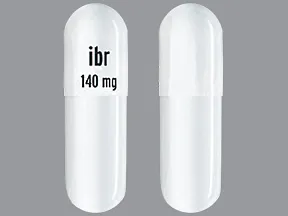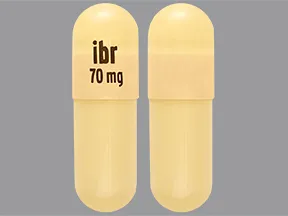Upset stomach, diarrhea, nausea, vomiting, decreased appetite, headache, joint/muscle pain, swelling of ankles/legs/feet, numbness/tingling of arms/legs, anxiety, constipation, dizziness, or tiredness may occur. If any of these effects last or get worse, tell your doctor or pharmacist promptly.
Remember that this medication has been prescribed because your doctor has judged that the benefit to you is greater than the risk of side effects. Many people using this medication do not have serious side effects.
This medication may raise your blood pressure. Check your blood pressure regularly and tell your doctor if the results are high. Your doctor may control your blood pressure with medication.
Tell your doctor right away if you have any serious side effects, including: easy bruising/bleeding, dark/tarry/bloody stools, fast/irregular/pounding heartbeat, unusual tiredness, swelling ankles/feet, signs of low red blood cell count (such as rapid breathing, pale skin, shortness of breath).
Ibrutinib sometimes causes side effects due to the rapid destruction of cancer cells (tumor lysis syndrome). To lower your risk, your doctor may add a medication and tell you to drink plenty of fluids. Tell your doctor right away if you have symptoms such as: low back/side pain (flank pain), signs of kidney problems (such as painful urination, pink/bloody urine, change in the amount of urine), muscle spasms/weakness.
This medication may lower your ability to fight infections. This may make you more likely to get a serious (rarely fatal) infection or make any infection you have worse. Tell your doctor right away if you have any signs of infection (such as sore throat that doesn't go away, fever, chills, cough).
This medication has rarely caused very serious (possibly fatal) liver disease. Tell your doctor right away if you develop symptoms of liver disease, such as nausea/vomiting that doesn't stop, loss of appetite, stomach/abdominal pain, yellowing eyes/skin, dark urine.
Very rarely, people taking this medication have developed other cancers (including skin cancer). Consult your doctor for more details.
Get medical help right away if you have any very serious side effects, including: chest pain, signs of bleeding in the brain or a stroke (such as fainting, sudden vision changes, severe nausea, seizures, confusion, weakness on one side of the body, trouble speaking).
A very serious allergic reaction to this drug is rare. However, get medical help right away if you notice any symptoms of a serious allergic reaction, including: rash, itching/swelling (especially of the face/tongue/throat), severe dizziness, trouble breathing.
This is not a complete list of possible side effects. If you notice any other effects not listed above, contact your doctor or pharmacist.
In the US - Call your doctor for medical advice about side effects. You may report side effects to FDA at 1-800-FDA-1088 or at www.fda.gov/medwatch.
In Canada - Call your doctor for medical advice about side effects. You may report side effects to Health Canada at 1-866-234-2345.

